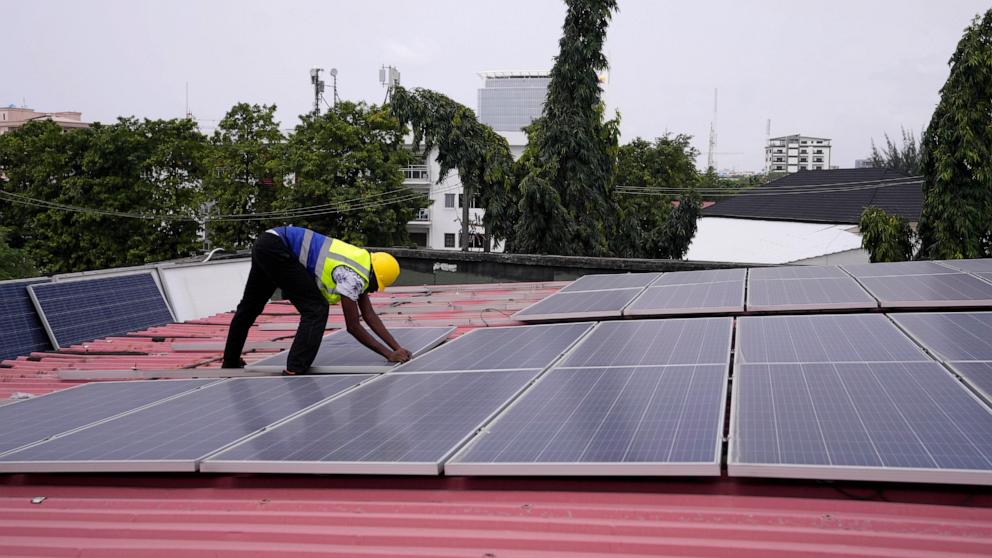NAIROBI, Kenya — When Ademola Adesina founded a startup in 2015 to provide solar and battery-powered subscription packages to individuals and businesses in Nigeria, it was much harder to raise money than it is today.
Climate technology was new in Africa, the continent was a fledgling destination for venture capital money, there were fewer funders to approach and less money available, he said.
It took him a year of “running and scouring” his networks to raise his first amount, just under $1 million, from venture capital firms and other sources. “It was all a learning experience,” he said.
But the ecosystem has changed since then and Adesina Resource Energy has raised close to $30 million over the years, mainly from venture capital firms.
Funding for climate tech startups in Africa from the private sector is growing, with companies raising more than $3.4 billion since 2019. But there is still a long way to go, as the continent needs $277 billion annually to meet its goals climate for 2030.
Experts say that to unlock funding and fill this gap, African countries need to address risks such as currency instability, which they say reduces investor appetite, while investors need to broaden their scope of interest to more climate sectors such as flood protection, disaster management and heat management. use various financing methods.
Still, the investment numbers for the climate tech sector, which includes renewable energy, carbon removal, land restoration, and water and waste management companies, are compelling: Last year, the continent’s climate tech startups raised $1.04 billion, up 9% from the previous year and triple what they raised in 2019, according to funding database Africa: The Big Deal. That was despite a decline in the amount of money raised by all startups in total on the continent last year.
That matters because climate technology requires experimentation, and venture capital firms that provide money to startups are playing an essential role in giving venture capital to climate technology companies, Adesina said. “In the climate space, a lot of things are uncertain,” he said.
The money raised by climate tech startups last year was more than a third of all the funds raised by startups in Africa in 2023, making climate tech second only to fintech, a more mature sector.
Typically, venture capital is given to companies with substantial risk but great potential for long-term growth. Startups use it to expand into new markets and to get products and services to market.
Venture capitalists “can take risks that other people can’t take, because our business model is designed to fail,” said Brian Odhiambo, a partner at Lagos-based Novastar Ventures, an Africa-focused investor. “Not everything has to succeed. But some will, and those that do will succeed massively.”
That was the case for Adetayo Bamiduro, co-founder of MAX, formerly Metro Africa Xpress, which manufactures electric two- and three-wheelers and electric vehicle infrastructure in Nigeria and has raised just under $100 million since its founding in 2015.
Adetayo said venture capitalists “are playing a catalytic role that is extremely essential.”
“We all know that to really decarbonize our economies we have to make investments. And it is not a trivial investment”, he said.
The funds can also bridge the gap between traditional and non-traditional sectors, said Kidus Asfaw, co-founder and CEO of Kubik, a startup that turns hard-to-recycle plastic waste into durable, low-carbon building material. His company, which operates in Kenya and Ethiopia, has raised about $5.2 million since launching in 2021.
He cites waste management and construction as examples of traditional sectors that can connect with startups like his.
“There is so much innovation in these spaces that it can transform them over time,” he said. “VCs are accelerating that path to transform them.”
In addition to venture capital, other investors from private equity firms, syndicates, venture makers, grant providers and other financial institutions are actively funding climate initiatives on the continent.
But private sector funding generally lags far behind public funding, which includes funds from governments, multilaterals and development finance institutions.
From 2019 to 2020, private sector financing accounted for just 14% of all climate finance in Africa, according to a report by the Climate Policy Initiative, much lower than in regions such as East Asia and the Pacific at 39%, and Latin America and the caribbean in 49%.
The low contribution in Africa is attributed to investors putting money into areas they are more familiar with, such as renewable energy technology, with less funding for more diverse initiatives, said Sandy Okoth, capital markets specialist in green finance at FSD Africa . , one of the curators of the CPI study.
“The private sector sees this (renewable energy technology) as a more mature space,” he said. “They understand funding models.”
The technology to adapt to climate change, by contrast, is “more complex,” he said.
One startup working on renewable energy is Johannesburg-based Wetility, which last year secured $48 million in funding, mostly from private equity, to expand its operations.
The startup offers solar panels for homes and businesses and a digital management system that allows users to remotely manage energy use, as it tries to solve energy access and reliability issues in southern Africa.
“Private sector funding in the African climate is still quite low,” said founder and CEO Vincent Maposa. “But there is visible growth. And I think over the next decade or so you’ll start to see those changes.”
Investors are also starting to understand the economic benefits of climate change adaptation and solutions as they have a return on investment, said Hetal Patel, chief investment officer at Nairobi-based Mercy Corps Ventures, an early-stage venture capital fund initial focused on startups that create solutions for climate adaptation and financial resilience.
“We are starting to build a very strong business case for adaptation investments and making sure that private capital flows start coming in,” he said.
Maëlis Carraro, managing partner of Catalyst Fund, a Nairobi-based venture capital fund and accelerator that finances climate adaptation solutions, called for more diverse financing, such as combining public and private sector financing. The role of public finance, he said, should be to de-risk the private sector and attract more private sector capital to finance climate initiatives.
“We’re not going to go far enough with public funding alone,” he said. “We need the private sector and the public sector to work together to unlock more funding. And, in particular, looking beyond a few industries where innovation is very big.”
___
This story corrects the money raised by startup Kubik to $5.2 million, not $4.6 million.
___
The Associated Press’s climate and environmental coverage receives financial support from several private foundations. AP is solely responsible for all content. Find AP’s standards for working with philanthropies, a list of supporters and funded coverage areas at AP.org.
#money #African #climate #startups #huge #funding #gap #remains






